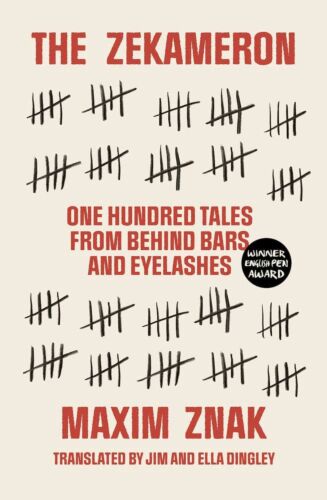The Zekameron
Znak, Maxim
Vertaald door: Jim and Ella Dingley
Scotland Street Press, 272 blz., paperback, 2024, ISBN 9781910895757
One hundred stories written in prison in Belarus in 2021 awaiting trial. While the futures of fellow prisoners hang in the balance, every detail of life is important: from the steps of the cockroach to the snores of cell mates.
Translated from the Russian by Jim and Ella Dingley.
With an introduction by ‘risen star of the international poetry world’ Valzhyna Mort.
WINNER OF ENGLISH PEN AWARD 2023
SHORTLISTED FOR THE REPUBLIC OF CONSCIOUSNESS PRIZE 2024
100 stories written from prison in Belarus with 'echoes of early Chekhov, Zoshchenko and Samuel Beckett' (Michael Pursglove). Despite its bleak context, this is a fundamentally optimistic book, engaging comically, yet honestly, with what it means to be human.
'Zekameron' comes from 'Zek' meaning prisoner and is a word-play on Boccaccio's Decameron. The 100 tales in Zekameron are based on the 14th Century Decameron, but Znak is closer to Beckett than to Boccaccio. Banality and brutality vie with the human ability to overcome oppression. Znak's stories in different voices chart 100 days in prison in Belarus today. The tone is laconic, ironic; the humour sparse. The stories bear witness to resistance and self-assertion and the genuine warmth and appreciation of fellow prisoners. The stories found themselves outside the prison walls and were sent directly to translator Jim Dingley.
'He came back from interrogation looking like death. Some people look better than he did when they're being put in their coffin."What happened then? Did they stick any other articles of the Criminal Code on you? Or break your jaw?""Nothing like that. I've got toothache..."
‘How did these stories get into your hands? They flew, as if painted by Marc Chagall, through prison walls, borders, and languages.’
- Valzhyna Mort
‘It’s a terse account of painful experience, prison, bewilderment; hugely atmospheric and extremely funny – full of dry wit and small biting observations.’
- Anna Vaught
